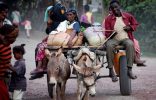The government of Ethiopia is set to discuss the socio-economic opportunities and challenges presented by humane and sustainable farming of donkeys for the emerging global trade.
The Forum, which will open in Addis Ababa Thursday November 29, 2018, discusses the emerging idea of donkey farming and trade for their skins / meat in Ethiopia while safeguarding its working donkey herd in the interests of the many people who depend on them. Donkeys in Ethiopia provide multiple services such as, transportation of goods especially in rural areas.
It is recalled that a few years ago the people around Bishoftu in Oromia Region of Ethiopia have opposed the government for issuing a license for a Chinese company to slaughter and export donkey meat.
Reports show that Ethiopia is currently re-evaluating its policy on the donkey skin trade after revoking licences for a number of donkey slaughterhouses last year due to public outcry.
Proposed options being considered by the government now include farming donkeys to meet the demand for skins from China, granting licences for the export of donkeys to be slaughtered outside the country or even re-opening slaughterhouses inside Ethiopia.
The pioneering forum will bring together key stakeholders from the donkey farming and slaughter industry as well as experts on donkey management, the development sector, tourism and culture and representatives from donkey-dependent sectors of civil society.
The forum organized by the Ethiopian Ministry of Agriculture & Livestock Resources and the Donkey Sanctuary, is expected to enable stakeholders to understand and identify the opportunities and challenges that the donkey skin and meat trade presents. It will facilitate a full and thorough analysis of the political, economic, social, cultural and environmental impacts on Ethiopia’s economy.
Globally, donkey populations are under threat from the escalating pressure for their skins, which are used to produce ejiao, a traditional Chinese medicine made with gelatin found in their hides.
“We want to see the donkey skin trade halted until such time as it is shown to be humane and sustainable. This applies to every country currently engaged in the trade,” said Simon Pope, campaigns manager at The Donkey Sanctuary.
“Here in Ethiopia we’ve been assured by the Government that trade will not impact on Ethiopia’s national donkey herd and that supply will only come from donkeys bred and farmed within the country for that sole purpose,” he said.
“As the global experts in donkey welfare we always seek to share our expertise and knowledge about the complexities and challenges of farming donkeys as we have done regarding the donkey dairy industry. This does not mean that we condone or promote or support donkey farming – simply that when the opportunity arises to inform a debate or discussion, then we will actively engage.”
Ethiopia is home to an estimated 8.5 million donkeys – thought to be the largest number in any one country. Current research from the University of Bristol in the UK shows that owning a donkey in Ethiopia can mean the difference between poverty and survival for some of the poorest communities in the country.
Bio-security threats to people and livestock (including donkeys) and the resulting risk of disease are also heightened by the currently unregulated global trade. These are all key concerns for the government and NGOs working to protect donkeys and the communities who depend on them for their livelihood.
Since its foundation by Dr Elisabeth Svendsen in 1969, The Donkey Sanctuary has grown from a charity rescuing UK donkeys from neglect and abuse to an international animal welfare organization transforming the lives of millions of donkeys and mules, and the people who depend on them for their livelihood.
The charity operates programs in almost 40 countries for animals working in agriculture, industry and transportation, and those used in the production of meat and skin. From the brick kilns of Asia to the rural communities of Africa and South America, programs are collaborative, with local teams and partners impacting on animal welfare through the education and training of owners and other.
